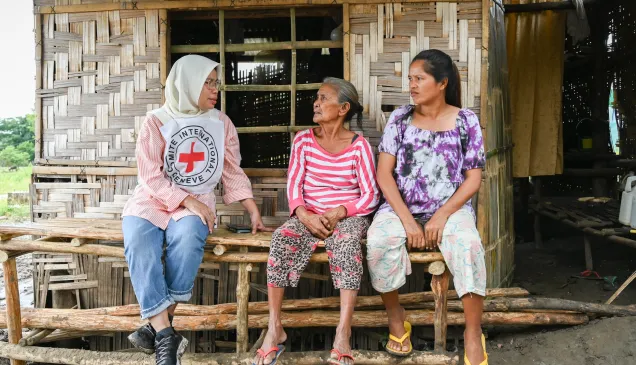The world is facing a grave protection failure: the failure to address the enormous harm caused by sexual and gender-based violence.
The International Red Cross and Red Crescent Movement and the United Nations, while working side-by-side in many places, very rarely speak out with one voice. But as you have heard today the Secretary General and I have felt compelled, with Julienne Lusenge, to make a public stand against sexual and gender-based violence and together call for urgent action.
Today we pledge to do better for the survivors of sexual and gender-based violence.
We demand an end to sexual atrocities used as a tactic of war.
We demand a change in attitudes that blame survivors, not the perpetrators.
We demand greater protections for communities at risk.
Above all, we demand that survivors are listened to, taken seriously and their needs are put first.
In this year, the 70th anniversary of the Geneva Conventions, we are asking States to restate their commitment to international humanitarian law.
The law is clear: rape and other forms of sexual violence are a violation. The Geneva Conventions made this prohibition clear and universal, and yet 70 years on we continue to face failures of behaviour and accountability.
The staff and volunteers of the Red Cross and Red Crescent Movement around the world, know only too well the devastating impacts that sexual and gender-based violence have on women and men, girls and boys.
We work with the survivors of horrific acts, including with:
Women and girls given as rewards in war;
Fathers whose sons have been abducted and raped;
Young women fleeing disaster and conflict only to be sexually enslaved; And with detainees when sexual atrocities are wielded as a means of torture.
We see the enormous and lasting harm that sexual and gender-based violence causes: both physical and psychological. Too often it is committed with the intent to de-humanize and degrade.
We also know there are violations that we do not see or hear: sexual violence is a crime obscured by taboo. Because of victim-blaming and stigma, too many walk with a secret shame. It goes unreported, covered up and too often the perpetrators go free.
These violations are horrific. They should shock us – but instead of turning away in horror or discomfort we must act.
Survivors, communities at risk, and advocates are telling us that more needs to be done. In communities affected by violence, young women report their greatest fear is sexual violence. They are asking for us to step up.
We are listening, and we must respond with all urgency. Communities are asking for safety and security; access to health services, and for survivors to be treated with respect and dignity. Today, we pledge to do more.
We will engage more strongly with communities, and we will be guided by the needs and wishes of survivors. Too often there is a lack of investment in survivors’ rights, resilience and capacities.
We will continue to support survivors and their local organisations. I recognise the brave Red Cross, Red Crescent and UN workers, local NGOs and advocates, like Julienne, who continue helping their brothers and sisters despite receiving threats in carrying out work that is challenging power imbalances and harmful social practices. I say to you – your work is valued, it is critical, keep striving to make the difference. We will continue to support you.
In response to community needs, we are increasing mental health and psychosocial support services, as well as economic support. We are working with survivors who come to our door, and we will reach out into communities to find those suffering in silence. Through the humanitarian principles of neutrality and impartiality, we will work with children and adults, regardless of gender, however defined.
Today the International Committee of the Red Cross is launching an appeal for CHF 27 million to help us better respond to sexual violence in 14 key countries, including expanded services in Colombia, improved responses in Syria and new services in the Central African Republic. For the first time we will place dedicated specialists in six countries this year to increase the field coordination of our response.
We are concerned with prevention as well as response. Sexual violence is not an inevitable part of war - and not all armed actors rape. This means violations can be prevented. We are talking with arms bearers and authorities to understand these practices of restraint, to better influence and prevent violations before they occur.
We are working to protect communities in the path of harm: the risk of abuses is higher in the wake of disasters, for vulnerable migrants, and those living in poverty. The International Federation will ramp up its support of National Societies to strengthen local services that put survivors at the centre, including in health and building livelihoods.
Collectively we have a responsibility to do better: current efforts are clearly falling short. The ICRC with the International Red Cross and Red Crescent Movement and the UN today pledge to do better for survivors and communities at risk. Sexual and gender-based violence is simply not something we can accept: we cannot fail those who need us most.



